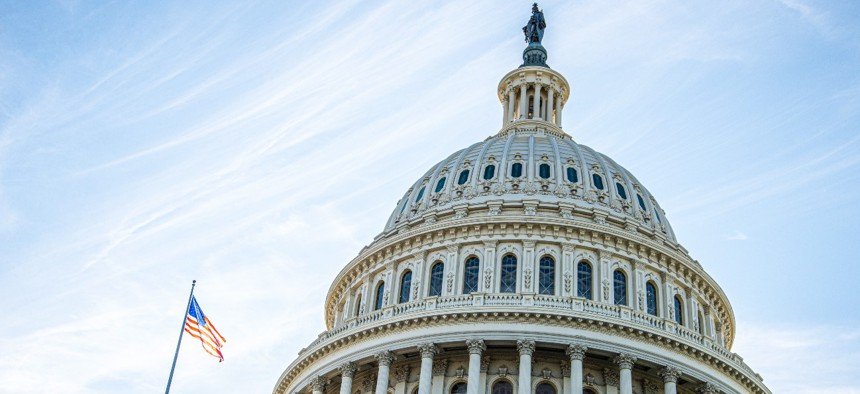
Elisank79 / iStock.com
Biden ‘Will Veto’ Measure to Block OSHA Vaccine Rule
The Senate voted on Wednesday night to pass the resolution.
The White House on Tuesday formally came out against the bicameral resolution to nullify the coronavirus vaccine rule for private businesses ahead of the vote in the Senate on Wednesday night.
All Republicans in the House and Senate, plus two Senate Democrats, have backed a joint resolution to block the Occupational Safety and Health Administration’s rule for private businesses with 100 or more employees using the Congressional Review Act. The rule, currently halted by a federal court, requires employees to get vaccinated or submit to regular testing and wear face masks while at work.
“The COVID-19 Vaccination and Testing [emergency temporary standard] is necessary to protect workers from the grave danger that they face in their workplace during the devastating COVID-19 pandemic,” said a statement of administration policy. “In 1970, President Nixon signed the Occupational Safety and Health Act to give the Department of Labor’s Occupational Safety and Health Administration the responsibility to issue an emergency standard when workers are faced with a grave danger such as COVID-19.”
The statement noted that the majority of adults are already fully vaccinated, so they won’t face any burden from the rule, and small businesses are exempt.
“At a time when COVID is on the rise, a new variant is on the loose, and more Americans are choosing to be vaccinated, it makes no sense for Congress to reverse this much-needed protection of our workforce,” the administration continued. “It puts our recovery in danger, and a vote for this resolution risks a return to shutdowns, layoffs and closures that result from allowing COVID to spread more easily in the workplace.”
White House Press Secretary Jen Psaki echoed this point during the briefing on Tuesday when asked for reaction that two Democrats have come out in support of the resolution.
Additionally, the OSHA rule is “building on what we’ve already seen businesses do on their own,” Psaki said. “If [the resolution] comes to the president’s desk, he will veto it. And we’ve got a new variant, and cases are rising. The president has been clear we’ll use every tool to protect the American people, and we hope others will join us in that effort.”
The Senate voted 52-48 on Wednesday night to pass the resolution.
In the House, it’s a little more complicated.
The resolution was introduced in the House on November 17 and House rules say that any bill has to sit in committee for at least 30 days before it is eligible for a discharge petition, Michael Plummer, press secretary for Rep. Fred Keller, R-Pa., who is leading the effort in the House, told Government Executive. A discharge petition requires 218 signatures. Plummer expects the vote in the House to happen in mid to late January.
Speaking from the Senate floor on Wednesday morning, Senate Majority Leader Chuck Schumer, D-N.Y., condemned the Republican-led proposal, which he called “anti-science, anti-vaccine.” With the spread of the Omicron variant, encouraging vaccinations is all the more important, he said.
In response, Senate Minority Leader Mitch McConnell, R-Ky., said there is “no bigger proponent of vaccination than I am.” However, “the United States is a free country. The federal government, the elites in Washington, cannot micromanage citizens' personal choices without a legitimate basis in law and the Constitution.”
Sen. Joe Manchin, D-W.Va., was the first Democrat to come out in support of the Congressional Review Act resolution and then Sen. Jon Tester, D-Mont., followed on Tuesday.
Tester said in a statement on Tuesday he's supporting the measure out of concern for its impact on businesses and his state’s economy, but “I strongly urge every eligible Montanan to get vaccinated as soon as possible so we can end this pandemic once and for all.”
Regulatory experts previously told Government Executive that the resolution faces tough odds of actually going through.
“These resolutions each have a large number of cosponsors, suggesting that they are being used for signaling purposes despite very low odds of enactment,” said Bridget Dooling, research professor at The George Washington University’s Regulatory Studies Center.
Update: This article has been updated to reflect the Senate' passage of the resolution.







